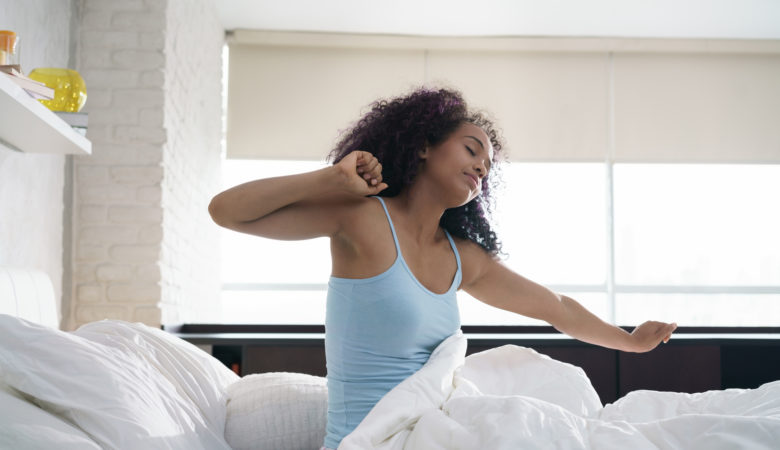The Changing Seasons Could Be Affecting Your Sleep

Now that fall is here, you might feel like it’s time to hunker down and hibernate until spring returns. As Daylight Savings Time ends on November 6, the days will seem especially short and cold. If that makes you want to go to bed early, you’re not alone: the changing seasons can impact your sleep schedule.
Our bodies depend on natural light to help regulate our circadian rhythms, which in turn regulate our sleep/wake cycles. When the seasons change, it can disrupt our normal sleep schedules and leave us feeling exhausted.
Here’s how the changing seasons could affect your sleep schedule, and how to adjust accordingly.
Spring
It’s always pleasant to see plants and trees regrow after a long, cold winter—but that also means that pollen is back with a vengeance. Blooming flowers and tree pollen can trigger allergic reactions, especially at night. In fact, pollen can make hay fever symptoms worse. Coughing and sneezing makes it hard for anyone to get quality sleep.
Of course, spring is the beginning of Daylight Savings Time, which means we “lose” an hour of sleep. While it’s nice to have extra light in the evening, it can be tough to adjust our sleep schedules.
Take a two-pronged approach to sleep. In 2023, Daylight Savings Time begins on March 12. A few weeks prior, start shifting your sleep schedule by 15 minutes every few days. If you make gradual changes, you’re less likely to feel like a zombie on March 13.
To prevent allergies interfering with sleep, make sure that you wash and dry your bed linens once a week on the hottest recommended setting. This will keep you from inhaling pollen when you’re trying to rest. Furthermore, try to dust and vacuum your bedroom before you put on the new linens. Stay indoors on high pollen days can also help.
Summer
Summer’s long days and short nights can impact our sleep schedules in a different way. It’s hard to get to sleep when the sun sets anywhere between eight to 10 pm. Furthermore, the hot temperatures can interfere with our bodies’ natural melatonin release, which sends signals that it’s time to go to sleep. Heat and humidity have the opposite effect: it increases your body’s thermal load, accelerates the heart rate and contributes to waking up overnight. The constant disruptions not only interfere with sleep length, but also the quality and depth of sleep.
Unfortunately, keeping your home cool in the summer can be expensive and wasteful. The best way to combat summer’s sleep challenges is to use blackout curtains. This will not only block out light, but it can help keep your bedroom cool.
Staying cool is particularly important. Whether you have air conditioning or not, a gel cooling pad on your mattress can make a big difference. Choose breathable, moisture-wicking sheets like cotton or bamboo. Taking cold showers before bed and sleeping with an ice pack on the back of your neck can also help your body regulate its temperature.
Fall
Fall signals the end of Daylight Savings Time, which gives you an “extra” hour of sleep—but the early sunsets can also make us feel tired earlier in the day. The decreased light leads to lethargy. Luckily, the temperatures are cool and you’re less exposed to light pollution, making it easier to sleep.
Like spring, you can combat the end of Daylight Savings Time by gradually adjusting your sleep schedule weeks ahead of time. It’s also important to make sure that you get plenty of sunlight during the daytime, to help your body naturally regulate sleep cycles. UV lamps can also help.
Winter
Winter has similar challenges to fall. Because it can get dark outside as early as four pm, our bodies have a tough time differentiating between day and night. It might be easy to fall asleep—but staying asleep and waking up are harder.
If you’re having trouble regulating your sleep cycle in the winter, a UV lamp can work wonders. These lamps give you the UV exposure your body needs to regulate your sleep cycles naturally (or as naturally as possible). A humidifier helps combat dry nasal passages and tissues, and keep a tube of lip balm near your bed for emergencies.
Sleep well, all year long
Making these simple adjustments will help you regulate your sleep cycle, without the use of medication. Try these tips to enjoy great sleep, all year long.

